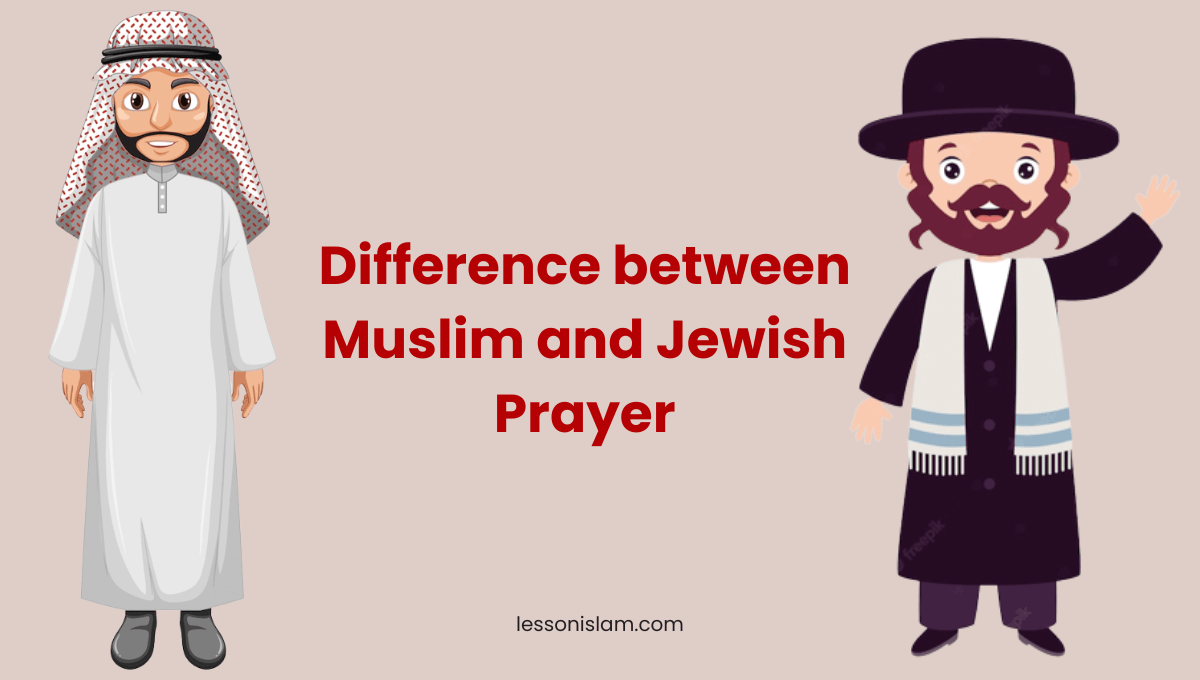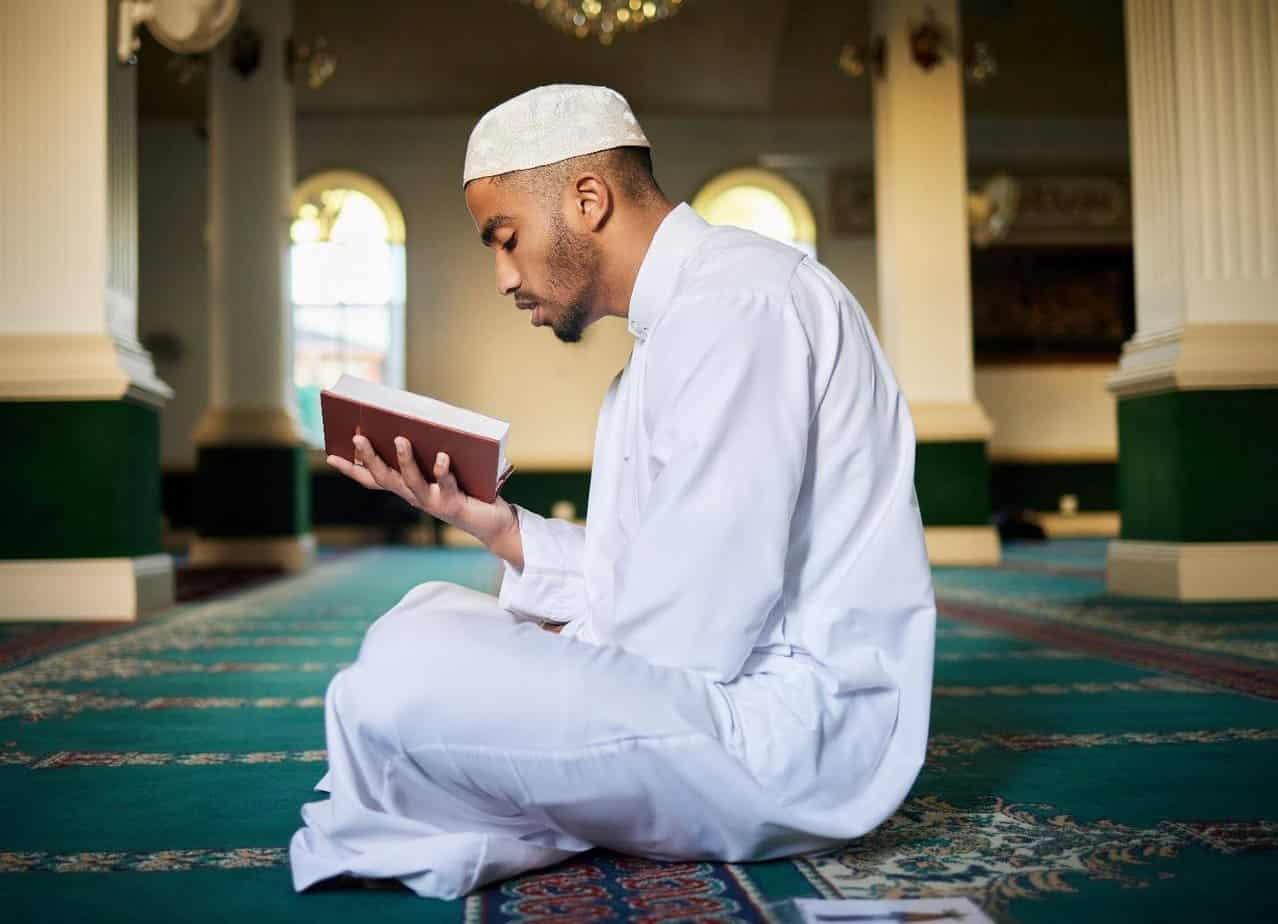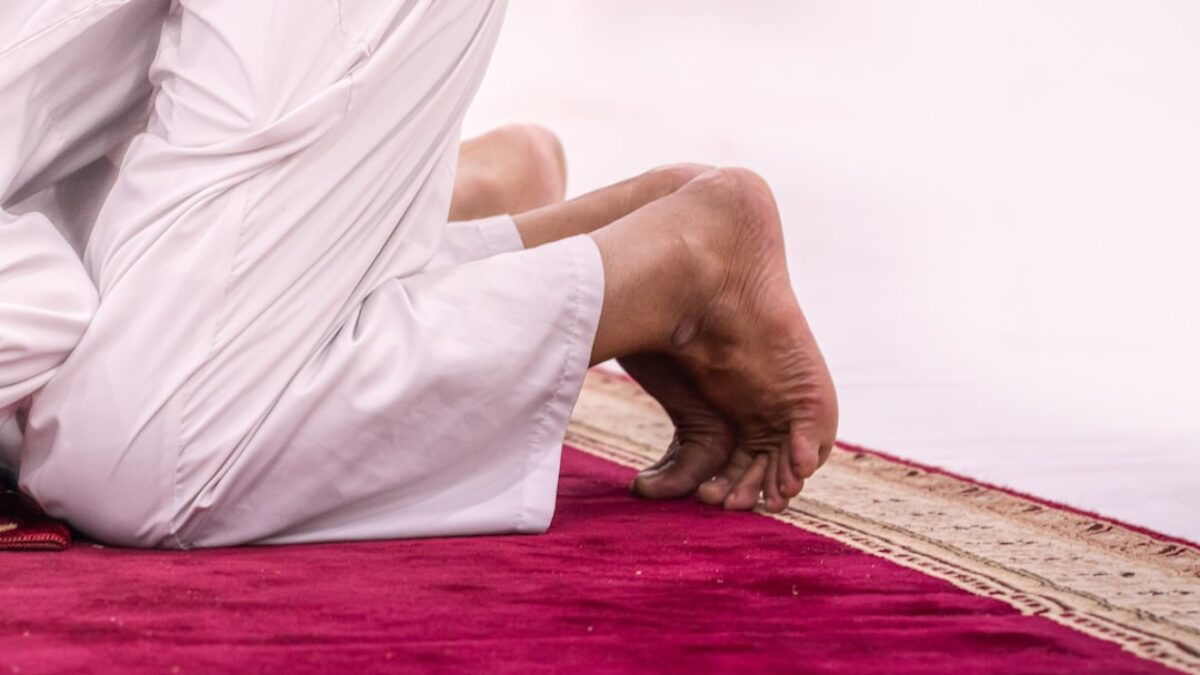Prayer is the only way a person can communicate with god whether he follows any religion, such as Islam, Judaism, or Christianity; the only difference is that some religions, such as Islam, give more importance to prayer.
Often people get confused about the Major difference between Muslim and Jewish Prayer. This article discusses the main difference between Muslim Prayer and Jewish Prayer. And what does the importance of prayer in each religion?
First, we should know about the importance of prayer in each religion. And the rewards they get for praying. Let’s start with Islam.
Muslims practice the Five Pillars of Islam, which include the declaration of faith, Prayer, Fasting, Charity, and pilgrimage to Mecca. Daily five-time praying is the most important pillar of Islam. As our beloved prophet, Muhammad PBUH, has already told us, what does the importance of five-time praying? There are many authentic hadiths for praying.
The Prophet (ﷺ) said, “Whoever purifies himself in his house, then comes to the mosque of Quba and prays in it, he will have a reward like the Umrah pilgrimage.
The following is reported from Abdullah bin Qurt (May Allah be pleased with him): The Messenger of Allah (PBUH) said, “On the Day of Judgment, a slave will be questioned about his prayers first. If his prayers are good, his other deeds will be good, too. If his prayers are bad, his other deeds will be bad, too.” (Tabarani, Targhib)
Ibn Umar (r.a.) narrates: The Messenger of Allah (PBUH) stated the following: “The place of prayer (salah) in religion is like the place of the head in the body.” (Majmau’l-Awsat, 3:154, (2313.) Imam Tabarani, Mu’jamu’s-Saghir)
We can understand from these hadith how important prayer is in Islam. And there are multiple rewards from Allah SWT for those who pray daily.
On the other hand, Judaism also has faith in prayer, and praying is a center of Jewish worship and daily life; they pray to communicate with God, express gratitude, and seek forgiveness; they also ask for blessing and success in life.
Praying three times a day is mandatory in Judaism. They pray in the morning, afternoon, and evening. These prayers include blessings for food, the Torah, and special occasions such as weddings and funerals.
As we have seen both belivers follows their religioun. A Muslim is a follower of the Islamic faith, which is based on the belief in one God and the teachings of the Prophet Muhammad (PBUH). whereas A Jewish is a follower of the religion of Judaism, which is based on the belief in one God.
We can see some notable different in between Muslim Prayer and Jewish Prayer such as Languages, Prayer Frequencyes, Praying direction, Ritual objects, Physical postures. There are many differences between Muslim and Jewish prayer, each of the differences we’ll try to explain each.
To learn about the Difference between Christian and Muslim Prayer, please refer to my previous post in addition to reading this one.
Muslim Prayer
Praying in Islam is one of the main pillars of the Muslim faith prayer, also known as salah or salat and namaz; Praying five times daily is mandatory for those who have reached the age of puberty. except those who cannot perform the salah due to mental and physical health disabilities. and that is menstruating (hayd) or experiencing postnatal bleeding (nifas).
Performing salah is a physical and spiritual act of worship that is mandatory for every adult Muslim. Muslims pray for direct communication with Allah, strengthening one’s faith and seeking guidance and forgiveness.
The structure of Muslims’ prayer includes specific physical movement; while praying, they recite particular verses of the holy Quran. Muslim prayer five times a day, the name of five-time salah is following.
- Fajr: the pre-dawn prayer
- Dhuhr: the midday prayer
- Asr: the afternoon prayer
- Maghrib: the sunset prayer
- Isha: the night prayer
Content of Muslim prayer while praying, they performed some main rituals such as – Takbeerat, Al-Qiyam, Ruku, Qiyam, sujood (Sajda), Tashahhud, and Salam.
Praying five times daily salah is mandatory in Islam. Allah SWT says in Quran.
“O you who have believed, seek help through patience and prayer. Indeed, Allah is with the patient.” (2:153)
“Indeed, those who believe and do righteous deeds and establish prayer and give zakah will have their reward with their Lord, and there will be no fear concerning them, nor will they grieve.” (2:277)
Those who pray salah of their time allah SWT will give multiple rewards for them. these are virtues of Salah
- “The first matter that the slave will be brought to account for on the Day of Judgment is the prayer. If it is sound, then the rest of his deeds will be sound. And if it is bad, then the rest of his deeds will be bad.” [Recorded by al-Tabarani. According to al-Albani, it is sahih. Al-Albani, (Sahih al-Jami’, vol.1, p. 503)
- It is narrated by Ahmad (18345) from Hanzalah al-Kaatib, who said: I heard the Messenger of Allah (blessings and peace of Allah be upon him) say: “Whoever regularly offers the five daily prayers, with their bowing, prostration and wudoo’, offering them on time, and realises that they are truly prescribed by Allah, will enter Paradise” or “Paradise will be his due.”
- Salah is the first and most important thing ordained by allah swt, and it shall be the first and most important thing to be accounted for on the day of judgment.
- One of the basic differences between believers on non-believers is Salah.
- Salah is the second most important pillar in Islam.
It has usually been noticed that Muslims read Salah on a mat and offer salah in a specific direction: that is Kaaba the Qibla, so let’s know about it; after all, is it essential to do this in Islam, and will it be Salah without a mat or not?
You can also pray without a mat and rug because a mat and rug are not required for prayer, but the condition is that the place should be clean; that is, there should be no impurity or dirt of any kind.
We should take care of our posture which is properly laid towards the Kaaba. Be it or not, if our direction is not right, our prayer will not be performed, it will not be accepted.
Muslims’ prayer, also known as salah the second most important pillar in the five basic pillars of Islam. Praying five times daily is mandatory for those who have reached the age of puberty, with the expectation of those who do not have good physical and mental health and that menstruating (hayd) or experiencing postnatal bleeding (nifas).
Praying five-time salah on their time is necessary for everyone in Islam except those who cannot perform the salah due to mental and physical health disabilities. and that is menstruating (hayd) or experiencing postnatal bleeding (nifas). these five prayers are;
- Fajr: The pre-dawn prayer, performed before sunrise.
- Dhuhr: The midday prayer, performed after the sun has passed its zenith.
- Asr: The afternoon prayer, performed in the late afternoon.
- Maghrib: The sunset prayer, performed just after the sun has set.
- Isha: The night prayer, performed after twilight, has disappeared.
The time of these five payers depends on your location, and the time is flexible for these prayers based on the sun’s position. Often time determined by the local mosque or Islamic center.
We should also know Islam in additional five obligatory prayers, some of the sunnah, nafl and witr prayer performed before and after the five obligatory prayers.
How many times a day do Muslims pray?
Muslim Praying five times daily is mandatory for those who have reached the age of puberty, in islam.
Can Muslim women lead prayer?
Yes, Women can lead other women in prayer, but the women leader, imam she, does not stand in front of other women. Rather, she should stand among them or between them. They should all be in one line together.
Jewish Prayer
Judaism also has faith in prayer, and praying is a center of Jewish worship and daily life; they pray to communicate with God, express gratitude, and seek forgiveness; they also ask for blessing and success in life.
Praying three times a day is mandatory in Judaism. They pray in the morning, afternoon, and evening. These prayers include blessings for food, the Torah, and special occasions such as weddings and funerals.
The main question is what Amidah and what is important is amid in Jewish.
What is Amidah
Amidah is the most important worship in Judaism. This Amidah worship is also known as Shmoneh Esrei or Eighteen Blessings. In Judaism, worship is performed in the morning, afternoon and evening Amidha.
Why amid is it so important is Jewish? These are some notable points.
- Historical significance: according to Jewish, The amid is that prayer which Jews have recited. Jews believe that amid was recited by Jews thousands of years ago, and amid is one the oldest prayer in Jewish tradition.
- The way of communication with god: according to Jewish, the amidha is the only way to communicate with god. The amidha also recites to express their problems and needs and ask for forgiveness.
Shawls and tefillin prayer are the most important rituals in Judaism. These prayers have meaningful symbolic and spiritual meanings. Jews used shawls and tefillin during praying and rituals in Judaism.
Prayer shawls(tallit): prayer shawls, also called tzitzit this is a rectangular prayer in this prayer. They are attached to four corners. The tallit is usually worn draped over the shoulder during the morning. Some Jewish people, men and women, wear a tallit.
Tefillin (phylacteries); Jewish strapped the tefillin with the arm and forehead during morning prayer. Tefillin are small black leather boxes which contain scrolls with passages from the Torah,
Jewish worship and daily life; they pray to communicate with God, express gratitude, and seek forgiveness; they also ask for blessing and success in life.
Different types of prayer and their timings in jewish law.
1. Shacharit (morning prayer): Shacharit is usually performed after sunrise, one of the mandatory prayers in three daily prayers service. It is often performed before or during morning hours.
2. Mincha (afternoon prayer): Mincha is the second most important of the three daily prayers service. This prayer is performed in the afternoon or midday hours. This prayer is also mandatory in Jewish law.
3. Maariv (evening prayer): Maariv is the daily evening prayer service. This prayer is the third most important prayer in daily three mandatory prayers in Jewish law. Which is typically performed in the evening and early night hours.
How many times a day do Jews pray?
Jews Praying three times a day is mandatory in Judaism. They pray in the morning, afternoon, and evening.
What is the significance of the different types of Jewish prayer?
Jewish worship and daily life; they pray to communicate with God, express gratitude, and seek forgiveness; they also ask for blessing and success in life.
Can a non-Jew attend a Jewish prayer service?
Before attending Jewish prayer, it is always best before attending Jewish prayer to check with the synagogue or Jewish community. Jewish prayer services are generally open to Jewish community members and those interested in learning about or participating in worship.
Key Differences Between Jewish and Muslim Prayer
Here is a comparison of the number and frequency of prayers in each religion.
Praying five-time salah on their time is necessary for everyone in Islam except those who cannot perform the salah due to mental and physical health disabilities. and that is menstruating (hayd) or experiencing postnatal bleeding (nifas). these five prayers are;
- Fajr: The pre-dawn prayer, performed before sunrise.
- Dhuhr: The midday prayer, performed after the sun has passed its zenith.
- Asr: The afternoon prayer, performed in the late afternoon.
- Maghrib: The sunset prayer, performed just after the sun has set.
- Isha: The night prayer, performed after twilight, has disappeared.
In additional five obligatory prayers, some of the sunnah, nafl and witr prayer performed before and after the five obligatory prayers.
On the other hand, in Judaism, there are three mandatory prayers. These prayers are
- 1. Shacharit (morning prayer): Shacharit is usually performed after sunrise, This prayer is performed in the afternoon or midday hours.
- 2. Mincha (afternoon prayer): Mincha is the second most important of the three daily prayers service. This prayer is performed in the afternoon or midday hours.
- 3. Maariv (evening prayer): Maariv is the daily evening prayer service. Which is typically performed in the evening and early night hours.
In Judaism, they also have some additional prayers with three mandatory prayers. They also performed these prayers such as Birkat, Hamazon (grace after meals) after eating, and tefillat haderech before embarking on a journey.
The role of language and recitation in Jewish and Muslim prayer: While praying, Jewish used or recite Hebrew as a primary language; according to Judaism, Hebrew is a holy language and scriptures and tradition. They remember god.
Whereas Muslims, while praying, they typically involve reciting specific verses from the holy Quran. And they also seek forgiveness, saying All praises and thanks be to Allah.
Examination of the physical movements and postures used in each form of prayer
In both religions, people perform physical moments and important postures while praying. In Jewish prayer, some physical moments are:
Standing: while praying, Jews performed by standing at the place of worship.
Bowing: while performing amidha, Jews bow at some specific point
sitting: Jews also perform the prayer with sitting. While sitting, they typically read Torah.
Kneeling: Some Jews kneel during the penitential prayers on Yom Kippur.
Rocking: there are many Jews who have the custom of rocking back and forth during prayer, which is known as shucking. They believe rocking helps to focus the mind and body.
Whereas Muslims pray salah with many different postures, such as – Takbeerat ,Al-Qiyam ,Ruku ,Qiyam, sujod(sajjadh) ,Tashahhud, Salam.
Conclusion
The main differences between Jewish and Muslim prayers are:
- frequency of prayers: Muslims pray five times daily, whereas Jews three times a day.
- Direction of prayer: in the Muslim community, they pray towards the Kaaba in Mecca, whereas Jewish worshipers face Jerusalem and the western wall.
- Posture during prayer: Muslim worshipers pay their prayer with some important postures while praying, such as standing, bowing, and prostrating. Whereas the Jewish pray with three postures standing, sitting, bowing and swaying.
- Prayer language: Muslim worshippers conduct prayer in Arabic. They recite specific verses of the Holy Quran, whereas Jewish prayer is conducted primarily in Hebrew.
- Physical objects: Muslim worshippers use a prayer rug or mat while praying, whereas Jewish may use a prayer shawl known as a tallit and phylacteries known as tefillin.
Significance of prayer in both religions Praying: in Islam is one of the main pillars of the Muslim faith prayer, also known as salah or salat and namaz; Praying five times daily is mandatory for those who have reached the age of puberty. except those who cannot perform the salah due to mental and physical health disabilities. and that is menstruating (hayd) or experiencing postnatal bleeding (nifas).
Jewish worship and daily life; they pray to communicate with God, express gratitude, and seek forgiveness; they also ask for blessing and success in life. Praying three times a day is mandatory in Judaism. They pray in the morning, afternoon, and evening. These prayers include blessings for food, the Torah, and special occasions such as weddings and funerals.
Do Jews Pray in Similar way as Muslims?
No, Muslim and Jews both worshipers pray differently. There are many differences between Muslim and Jewish prayer. such as u003cstrongu003efrequency of prayersu003c/strongu003e,u003cstrongu003eDirection of prayeru003c/strongu003e, u003cstrongu003ePosture during prayeru003c/strongu003e, u003cstrongu003ePrayer languageu003c/strongu003e
What are the similarities and differences between Muslim and Jewish prayer?
There are no similarities between Muslim and Jewish prayer, but they have many differences, such as timing, posture, ablution, and language differences.
Can a Muslim perform Jewish prayer and vice versa?
This is not good practice to perform Jewish prayer and vice versa being a Muslim because Allah SWT creates humans only for Allah SWT worship.
Why do Muslims pray five times a day while Jews pray three times a day?
Muslims pray five times a day to fulfil the obligation, and praying five times is the command of Allah SWT. That’s why Muslims pray five times daily. On the other hand, Jewish pray three times a day. The tradition of praying three times a day dates back to biblical times when the prophet Daniel prayed three times a day.
How does the Jewish prayer book differ from the Islamic prayer book?
Muslim prayer book known as the holy quran and jewish prayer book known as siddur and the fundamentally different in their contnet, structure, and purpose.
























Post Comment